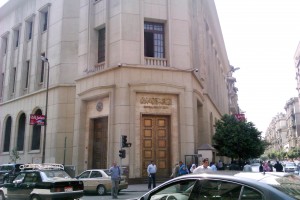
(Abdelazim Saafan/DNE Photo)
Domestic debt reached EGP 1.8tn in June 2014, of which 84.7% was government debt and 3.2% was public economic authorities’ debt, a monthly Central bank of Egypt (CBE) report revealed.
Egypt’s external debt increased by 4.8% to record 45.3bn at the end of March 2014, compared to $43.2bn at the end of June 2013.
The report indicated the rise is attributed to the hike in “net disbursements of loans, facilities and deposits to $1.6bn, and the increase of $516.8m worth in external debt because of the rise in most currencies of borrowing versus the US dollar”.
Discussing the balance of payments (BOP), the CBE report said Egypt recorded a $2.2bn surplus during the first 6 month of fiscal year 2013/2014, compared to $2.1bn during the same period last year.
The report added the improvement in the BOP was due to the retreat in the current account deficit to $232.7mn and the $3.5bn net inflow in the capital and financial account.
During the same period, the trade deficit declined by 1.5% to reach $25.2bn.
“This came due to the rise in export proceeds by 4.2% to $18.8bn, from $18.1bn, thereby outpacing the 0.8% increase in import payments, to post $ 44.0bn, from $43.6bn,” the report said.
Services, on the other hand, dropped from $5.4bn to $1.3bn. The report attributed this decline to the “57.3% drop in tourism revenues, to post US$ 3.4bn, against US$ 8.1bn”.
Another increase was noted in the foreign trade, which witnessed a 1.8% climb during July/Match FY 2013/2014. The main trading partner during this period was the European Union, accounting for 31% of the total trade volume while Arab countries came second at 26%.
“The rise in export proceeds was a result of the pickup of 13.8% in oil exports to $ 8.8bn, 46.5% of total exports, and the drop of 2.9% in non-oil exports, to $ 10.1bn, 53.5% of total exports,” the report read.
“In terms of merchandise classification, fuel and mineral oils increased by 13.0%, semi-finished goods by 12.7% and raw materials by 4.1%. Meanwhile, finished goods fell by 6.1%,” the report added.
The bank’s report added that imports also increase with fuel, mineral oils and products hiking by 20.3%. Immediate goods and consumer goods also surged by 11.4% and 0.9%.



